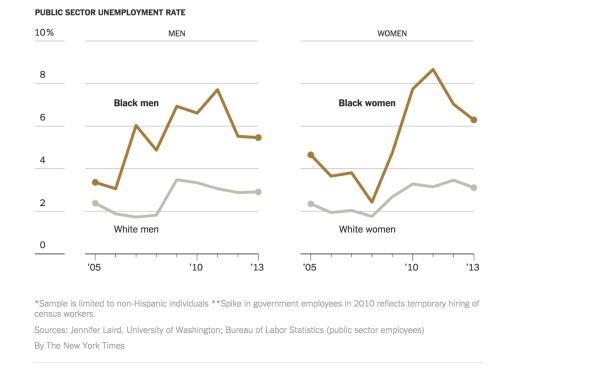Yesterday I posted on U.S. Judge Milton Shadur’s ruling that African American teachers who were laid off by the Chicago Public School constituted a class.
In other words, African American teachers were targeted.
The law suit will now proceed to trial and possible damages.
Today’s NY Times reports that public sector jobs have vanished.
And who have been the victims?
Because blacks hold a disproportionate share of the jobs, relative to their share of the population, the cutbacks naturally hit them harder.
But black workers overall, women in particular, also lost their jobs at a higher rate than whites, Ms. Laird found. There was a “double disadvantage for black public sector workers,” she said. “They are concentrated in a shrinking sector of the economy, and they are substantially more likely than other public sector workers to be without work.”
From National Public Voice and Fred Klonsky:
Judge Milton Shadur Gives The Chicago Teachers Union and Three Teachers Certification as a Class Action Against Racism by The Chicago Board of Education
 |
| Judge Milton Shadur |
#BlackTeachersMatter. U.S. Judge Milton Shadur calls CPS response to teachers discrimination lawsuit, “totally irresponsible.”
In 2011 the Chicago school board carried out large-scale layoffs of teachers and paraprofessionals.
African American board employees bore the brunt of the layoffs just as the board’s closing of neighborhood public schools two years ago mainly impacted African American communities.
As a result of the layoffs in 2011 the Chicago Teachers Union and three impacted teachers filed suit.
 |
| CTU President Karen Lewis speaking at Daley Plaza during the protest of Chicago school closings, 2013 |
As I understand it, a law suit like this has three components. First, the plaintiffs must show that they represent a class of people by a preponderance of the evidence. They were not just individual victims. It was not a coincidence that they were mostly African American. The judge is asked to certify that it is a class action before the case can move on to trial and a ruling of damages.
On Friday, Senior U.S. Judge Milton Shadur ruled in favor of the CTU and the three teachers.
However Judge Shadur didn’t just rule in the plaintiff’s favor.
The Judge was scathing in his rebuke of the CPS board.
“What does Board say on the critical issue of disparate impact in this critical case? Here are Amended Complaint 7 and 8 and Board’s “responses”:7. In June, 2011, the Board terminated theemployment of 931 classroom teachers through a round of layoffs. 480 of these teachers were tenured. African Americans made up 42% of the tenure teachers terminated, although constituting less than 29% of all CPS tenured teachers.ANSWER: The Board denies the allegations of paragraph 7.8. Defendant’s pattern and practice of targeting schools with high African American teaching populations for layoffs has a disparate impact on African American tenured teachers and staff.ANSWER: The Board denies the allegations of paragraph 8 and further states that the Board does not “target” schools, or any demographic of teachers or staff, for layoffs under any circumstance.And that’s it — the sum total of Board’s purported input on the subject of disparate impact, which is of course the essential linchpin for classcertification purposes. Board has said not a word, then or since then, about the claimed basis for its unsupported ipse dixit “denial.”In candor, that is totally irresponsible. This action has been pending for just short of 2-1/2 years: Plaintiffs filed their initial Complaint on December 26, 2012, and Board has known from day one about plaintiffs’ disparate impact contention and about the asserted numbers upon which those contentions rely.”
Judge Shadur’s ruling and order then proceeded through each requirement for certification as a class and sided with the teachers on each one.
He concluded:
Board’s only challenge to certification under Rule 23(b)(3) is its broken-record-type reassertion that individual principals fired plaintiffs, so that common questions do not predominate on that skewed premise. And that means Board has simply failed to raise any substantial challenge at all to plaintiffs’ arguments.
The case now will proceed to trial and damages.
